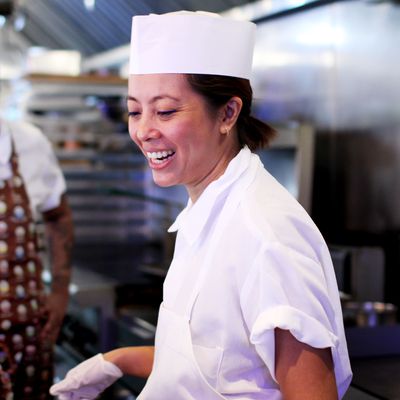
In this week’s Grub Street Diet, Angela Dimayuga, the executive chef of Mission Chinese Food, goes into great detail about her jam-packed schedule. She works incredibly hard, but she’s not married to her job and makes more time for friends and loved ones than most people working in a high-pressure kitchen job can manage. “I’m sure other chefs think, How is she able to do this?” she says. Here, she explains her managerial style, her thoughts on mental health, and why it’s so important to create new norms in restaurant kitchens.
We’ve been consciously planning to make our work-life balances more sustainable. That’s a big word we’re using — sustainable — when we have management meetings. Danny [Bowien] works a lot: Out of every person I’ve ever worked for, he never gives himself a day off. Something that I take pride in is that I always want to give my cooks time off, and I let them take vacations. It’s something that Danny inherently hasn’t really felt comfortable doing yet, but I want it to be part of our dialogue for our mental health and happiness.
We can’t just say that we’re working off of the adrenaline from opening a restaurant anymore. We’re past the review cycle, so let’s figure out how to make this lifestyle really work for us. It’s about communicating and saying, “I’m going to try to have an admin day, or a night off.” I was expediting every single night, making orders for 300 people, which, if it’s three plates per person, means 900 plates of food repeatedly — while also creating infrastructure. That’s a lot of things compounded in one.
Now my chef de cuisine, Quynh [Le], is expediting most nights, and he’s really doing a good job. As young cooks, you’re constantly viewed as a good chef if you’re consistent and can work well for that many hours. But we’re not martyrs — that’s not cool, and it’s not sustainable. I’m working on it with Quynh. This weekend, for example, he’s going to take a night off, and will hopefully take a trip to Philly to go to Zahav with me.
Everything starts at the top, so management is understanding that, for the rest of the business to function well, you need to set an example for your team. Even though I can get mean at work, it’s way less obscene and disgusting than things have been. I’m trying to create something healthy for my cooks, and also for me. The way restaurants have been, historically, is that killing yourself is considered admirable. It’s a kamikaze, basically — what are you doing?
We’re also in a crazy time, with this shift to closing the gap in pay for back-of-the-house, and we’re actively trying to figure out solutions. We have a great idea that we’re going to implement in the first quarter. We want to allow for face time between cooks and diners, in order for them to earn tips. My cooks who are full-time can take one day a week to push carts around and passionately talk about the food. And they’ll look cute with their hats and clean aprons. They’ll probably be able to sell food really well, and then they can make server-type money. Other restaurants are just eliminating tips: We need to find a way that works for us, and this feels organic.
It takes unlearning bad habits. It’s also just that you can do better work when you’ve tried to sleep or eaten a proper dinner. It’s something that I have to hand-feed to someone like Quynh. I see him as someone that I want to be by my side for a really long time. So he needs to not come in on his day off! And I need to do that, too. These are all things that are very new for me.




